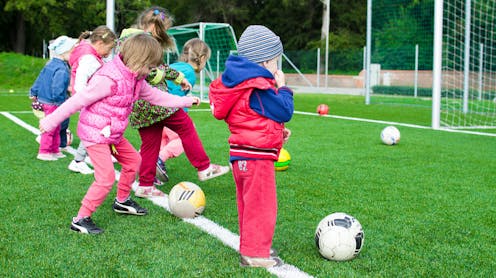
If your child is struggling with certain everyday activities - such as playing with other kids, getting dressed or paying attention - you might want to get them assessed to see if they need additional support.
Authors
- David Trembath
Professor of Speech Pathology, Griffith University
- Rachelle Wicks
Research Fellow in Disability and Rehabilitation, Griffith University
Currently, the way a child is assessed is often fragmented and time-consuming for families. If there's a concern, you might be talking to your child's school, have a referral to see a speech pathologist and be on a wait-list to see a psychiatrist .
We've developed a framework - in collaboration with 23 other community and professional organisations - to help make this approach more consistent for all Australian children aged 0-12 years.
The framework focuses on a child's functional strengths (what they can do day-to-day) as well as their challenges and aspirations, to work out what support they might need.
This is useful for all children and it means support can start sooner, whether or not a child has a diagnosis now or might have one in the future.
Working out what support is needed
All children have support needs. But when these needs go beyond what might be expected for their age, or that the people around them can manage, they may need additional help.
Take communication, for example.
Parents use strategies to help their children learn to talk, such as by encouraging them and showing them how to do it.
But for about 3.2% of children , communication difficulties substantially impact their ability to participate in everyday activities. An older child who is struggling to talk will find it harder to play and make friends with other children at childcare.
Understanding each child's need as well as their day-to-day functioning is the first step to getting appropriate support.
However, there are two main problems with how assessments are currently done.
A fragmented and inconsistent picture
The first problem is inconsistency . Doctors, teachers, childcare workers and allied health practitioners (such as physiotherapists or psychologists) all work hard to understand each child's strengths and needs. But they tend to do assessments differently.
This is not surprising - they are focusing on different things.
But this means information can be sometimes duplicated or missed, making it harder to join the dots.
For example, let's say a child with intellectual disability and minimal spoken language is avoiding eating most foods.
A psychologist may look at the child's behaviour, a speech pathologist at their swallowing, and a doctor at their nutrition. But unless they work together, it may take longer to understand the underlying issue - in this case, that the child has strong sensory sensitivities.
Without a consistent approach, it is difficult to form a holistic picture of a child's strengths and support needs across settings, let alone come up with a good plan for support.
Focusing on diagnosis, not function
The second problem is assessment often focuses too much on diagnosis and not enough on support.
Yet even children with the same diagnosis can have significantly different needs.
For example, among three autistic children, one may need 24-hour supervision and support to be safe.
The second may face challenges with a specific activity such as communicating at school, and benefit from targeted support from a speech pathologist.
The third child may not need any additional support at this point in time, beyond what is provided for all children.
Support needs also differ based on a range of personal and environmental factors, such as other health conditions, the quality of supports already in place (such as ramps for a wheelchair), or assistive technology (including mobility and communication aids).
What does the new framework recommend?
The framework focuses on what children can actually do and what they need help with, rather than a diagnosis.
It encourages each professional doing an assessment - whether an educator or health professional - to consider the child's existing context, including what supports they already have, their strengths and challenges. And it should consider their aspirations (what is most important to them and their hopes for the future).
The framework recognises a child's strengths and needs can change as they grow, and recommends follow-up assessments when there is a change, rather than following a set schedule.
We developed this framework by reviewing the evidence, looking at how assessments work in other countries, consulting widely with the disability community and yarning with Aboriginal parents and health professionals.
It outlines an approach that can be used consistently whenever a child is assessed across health, education, disability and community services.
What needs to happen next?
The framework is already available and is beginning to be used in practice.
But to make the approach consistent, we need to also provide training for professionals who assess children's strengths and needs, and a tool to gather and share the information consistently across different settings.
We're currently working on these. They will be ready by the end of the year, along with recommendations to government for supporting their roll-out across health, education, disability and community services.
If you're a parent, you don't need to wait for a diagnosis to start seeking support for your child. You can talk to a professional you trust, such as your family doctor or child's teacher about your concerns.
![]()
David Trembath receives funding from the Autism Cooperative Research Centre (Autism CRC), the Commonwealth Government, and the Stan Perron Charitable Foundation. The research featured in this article was commissioned by the Autism Cooperative Research Centre with support from a federal government Department of Social Services Information, Linkages, and Capacity-Building grant.
Rachelle Wicks receives funding from the Autism Cooperative Research Centre, the Commonwealth Government, and the Stan Perron Charitable Foundation. She also receives a small quarterly honorarium as Chair of the Autism Queensland Advisory Committee.






